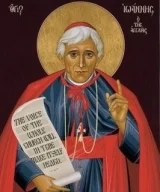(Unfortunately I neglected to post this message from Mgr. Keith Newton that was published in the newsletter of the Friends of the Ordinariate. It was written in Lent but contains his Easter greetings.
David Murphy)
Communion does not necessarily mean Conformity
The Ordinariate as a tool of Catholicity
As I write this message, we have just started the journey of Lent. Down the road from me there are Catholics, in full communion with Rome, who are yet to begin that journey. The Ukrainian Greek Catholic Church in London, based less than a mile away from my house in Soho, follows a different calendar to the one used by Western Christians.
Another Catholic community, the Melkites, who again meet not that far away in Pimlico, are also Eastern Rite Catholics, like the Ukrainians. But this community uses the Gregorian calendar – so they will celebrate Easter on the same day as those of us who belong to the Roman Rite.
Any Catholic in communion with Rome is able to fulfil their Sunday obligation by joining these two communities for the Eucharist. A properly disposed Latin Catholic would also be able to make his or her communion during the Divine Liturgy that they celebrate – usually the Divine Liturgy of St John Chrysostom. These communities represent but two of many different Rites and Churches in communion with Rome. Yet, if we were to join the congregation in reciting the Creed at either the Melkite parish or the Ukrainian Cathedral, we’d notice that the words “and the Son” (filioque) are missing from the section that describes the procession of the Holy Spirit. Communion does not necessarily mean conformity.
Some Latin Catholics seem to have great difficulty in accepting this notion of “unity without uniformity”, despite it being a core principle of Catholicism. After all, the word ‘catholic’ means ‘universal’ – the Church of Christ embraces all peoples, tribes and nations. She welcomes all tongues, and rejoices in the many legitimate rites and devotions that have arisen by the inspiration of the Holy Spirit working through the baptised people of God.
Some Eastern Churches, such as the Maronites, never stopped being in communion with Rome. Others, such as the Ukrainians and the Melkites, re-discovered the communion of
Peter over the centuries following the Great Schism of 1054. These Christians, especially, for example, members of the Belarusian, Romanian and Ukrainian Greek Catholic Churches, showed incredible bravery in asking to be readmitted into the communion of Rome. In doing so, they faced persecution by those who had once been their brethren, and distrust from Western Catholics – many of whom felt it necessary to ‘Latinise’ these ‘new’ fellow Catholics. I’m sure these Eastern Catholics have sometimes been ignorantly asked: ‘Why don’t you become proper Catholics?’
I feel privileged and honoured to have been asked to lead the first Ordinariate for former Anglicans. This is the first structure of its kind: offering to Western Christians from a
Reformation tradition a similar structure to those Byzantine Christians who wished to re-enter communion with the Pope. For the first time in the history of the Church, baptised Christians of a tradition that lost communion with the See of St Peter in the sixteenth century are welcomed into the Catholic Church, not as individuals but as a branch – once separated but now grafted back onto the Vine. Although we differ from the Eastern Catholics in that we do not have our own rite, and are fully within the Roman Rite, we in the Ordinariate, like the members of the Eastern Catholic Churches, are encouraged to rejoice in those Catholic traditions within the Christian heritage that formed us. In that sense, the Ordinariate is not about ‘gaining converts’, it is rather a means of adding to the rich diversity – catholicity – of the Catholic Church: a Church in which there is room for all.
As Mgr Mark Langham, the former Secretary for Anglican and Methodist Dialogues at the Pontifical Council for Promoting Christian Unity, said when he recently addressed a plenary gathering of Ordinariate Clergy, the Ordinariate: “[The Ordinariate] needs to be broadcast wider in ecumenical circles, [as] an assurance to other ecumenical partners that
the price of unity is not too high.”
I would like to take this opportunity to wish you all a blessed remainder of Lent and a very happy and holy Easter when it comes.
Rt Revd Mgr Keith Newton
Ordinary of the Personal Ordinariate of OLW
Honorary President of the Friends of the Ordinariate











I must admit that I am surprised that noone has commented on Mgr Keith’s message, especially the words “the Ordinariate is not about ‘gaining converts’, it is rather a means of adding to the rich diversity – catholicity – of the Catholic Church: a Church in which there is room for all“.
EITHER everybody has now begun to comprehend that this really is the Ordinariate’s mission, that proselytism is not our game, that we are not in the numbers business, OR people have just not noticed these words and read over them.
I certainly hope it is the former.
David Murphy
Well, David, to be true, the unabridged quote is “IN THAT SENSE, the Ordinariate is not about ‘gaining converts’”, which IMHO changes a lot.
Certainly, the Ordinariate is much, much more than ‘gaining converts’. The purpose of building the bridge across the Tiber is not only to make it easier for people to cross, but also to enable them to “carry their belongings and treasures” (which they had to leave on the other bank when the only option was to “swim”), so that they can enrich with them those of us, who are already here.
Fr Tomlinson’s post on how Pembury’s four former CofE clergy will soon be five suggests that the “numbers business” is not entirely insignificant, at least to him.